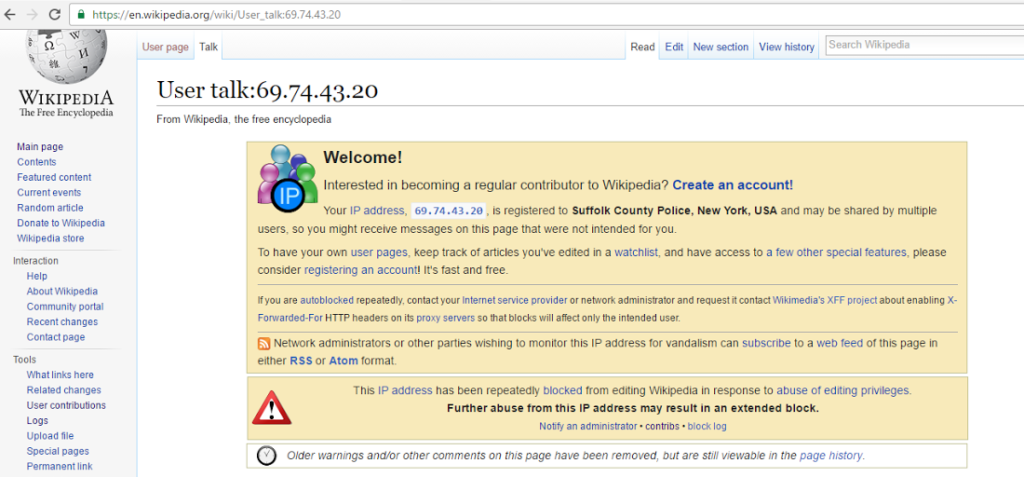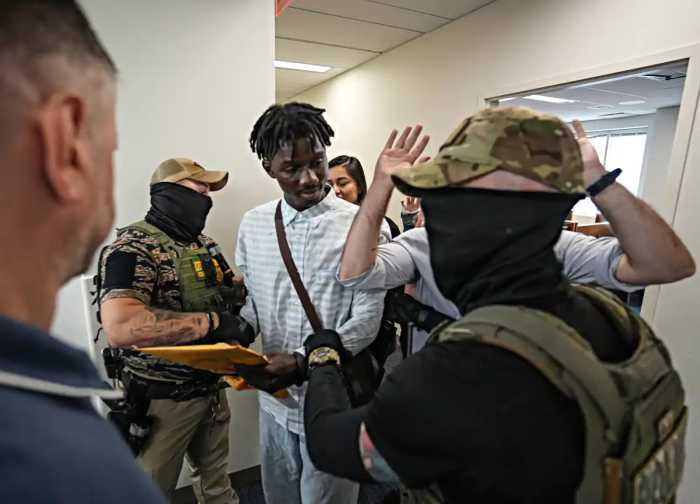Suffolk County police haven’t publicly named a suspect in the Long Island Serial Killer case, but someone in the department may have accused a former local jailer in an anonymous internet post.
Among the hundreds of edits to the Wikipedia page for the Gilgo Beach murders is a since-deleted revision that suggested the killer is Joseph Foti, a retired corrections sergeant at Suffolk jail currently being sued by five female inmates for sexual harassment. What made the change notable is that the IP address for the computer that named Foti is registered to the Suffolk County Police Department, according to Wikipedia’s log of the edit.
“What this edit did was change it from ‘The Gilgo Killer’ to ‘Joe Foti,’” said Lauren Franklin, a producer of The Killing Season, a documentary series about the case that recently aired on A&E, in the second episode after she unearthed the suspicious edit.
The Press independently verified that the April 29, 2012 edit appears as it did in the TV series and that the website identifies the IP address as being registered to the police department, meaning the user who made the change either has access to a Suffolk police computer or the agency’s internet.

Sunday marks the sixth anniversary of police finding the first of 10 sets of human remains dumped along Ocean Parkway by two or more assailants, one of whom is believed to be a serial killer responsible for murdering at least four of the victims.
A Suffolk police spokesman declined to comment when asked if the department is investigating who accused Foti while using what appears to be one of the agency’s own computers. Asked if Homicide Squad detectives are any closer to naming a suspect, a department spokeswoman declined to comment, citing the ongoing investigation.
Related Story: Red Herrings Among Tips in Long Island Serial Killer Case
When the docu-series filmmakers told Foti of their discovery, the ex-jail supervisor sounded both surprised and perturbed.
“That’s not good,” he was quoted as saying. “There’s really nothing to discuss. It is what it is.”
In 2013, a quintet of former pre-trial detainees filed a federal lawsuit alleging that in ’09 and ’10 they “were subjected to sexual assault, sexual harassment and sexually degrading treatment by Sergeant Joseph Foti,” the Press has reported. They also claim that he punished them when they complained about the harassment, and that more than 40 other women were also victimized but are afraid to come forward. The county attorney has said he would “vigorously” defend Suffolk against the claims.
Foti, of course, isn’t the first person to be accused on the internet of being the killer, and he likely won’t be the last. Experts have said some of the killer’s methods—for instance, calling a victim’s sister from a densely populated area but keeping the calls too brief to trace—suggests the Gilgo killer is a member of law enforcement, prompting some armchair detectives to publicly accuse specific police officers.
The family of Shannan Gilbert—whose 2010 disappearance from Oak Beach led to the discovery of the killer’s dumping ground—has said they believe she was slain by the same person who killed the others. Her family filed a wrongful death suit against Dr. Peter Hackett, a former Oak Beach resident and ex-police surgeon believed to be among the last people to see her alive. Investigators cleared him in the case and police have said they suspect Gilbert wasn’t slain, but accidentally drowned in a marsh.
Shortly after Foti was accused online in 2012, Suffolk police and prosecutors had issued a joint statement that sought to dispel widespread internet rumors that another man—a local nursery owner who committed suicide—was the killer.
“Unfounded, anonymous internet postings or rumors about who may be a suspect should be given the appropriate weight they deserve by those who read them,” the statement read. “It should be remembered that this type of unsubstantiated ‘gossip’ can cause substantial harm and emotional trauma.”
The same statement could be applied to Foti and any others who get slapped with such a label before investigators make their case. At least in the latest instance, the accused is still alive to defend himself.
































